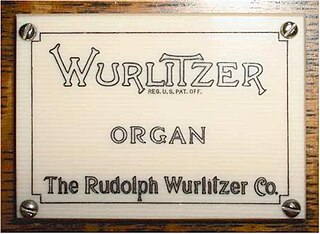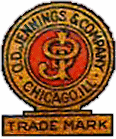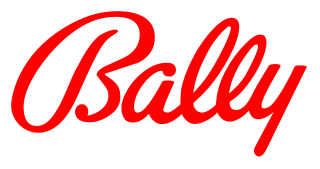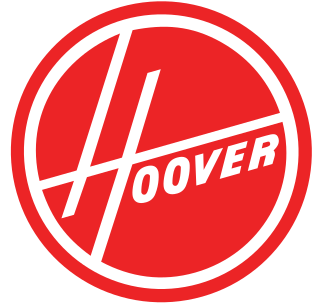
A jukebox is a partially automated music-playing device, usually a coin-operated machine, that plays a patron's selection from self-contained media. The classic jukebox has buttons with letters and numbers on them, which are used to select specific records. Some may use compact discs instead. Disc changers are similar devices for home use; they are small enough to fit on a shelf and can hold up to hundreds of discs, allowing them to be easily removed, replaced, or inserted by the user.

WMS Industries, Inc. was an American electronic gaming and amusement manufacturer in Enterprise, Nevada. It was merged into Scientific Games in 2016. WMS's predecessor was the Williams Manufacturing Company, founded in 1943 by Harry E. Williams. However, the company that became WMS Industries was formally founded in 1974 as Williams Electronics, Inc.
Chicago Coin was one of the early major manufacturers of pinball tables founded in Chicago, Illinois. The company was founded in 1932 by Samuel H. Gensburg to operate in the coin-operated amusement industry. In 1977, Gary Stern and Sam Stern purchased the assets of the Chicago Coin Machine Division as it was then called to found Stern Electronics, Inc. They also produced various arcade games during the 1960s to 1970s.
Stern is the name of two different but related arcade gaming companies. Stern Electronics, Inc. manufactured arcade video games and pinball machines from 1977 until 1985, and was best known for Berzerk. Stern Pinball, Inc., founded in 1986 as Data East Pinball, is a manufacturer of pinball machines in North America.

Riverview Park was an amusement park in Chicago, Illinois, which operated from 1904 to 1967. It was located on 74 acres in an area bound on the south by Belmont Avenue, on the east by Western Avenue, on the north by Lane Tech College Prep High School, and on the west by the North Branch of the Chicago River. It was located in the Roscoe Village neighborhood of Chicago's North Center community area.

The Rudolph Wurlitzer Company, usually referred to as simply Wurlitzer, is an American company started in Cincinnati in 1853 by German immigrant (Franz) Rudolph Wurlitzer. The company initially imported stringed, woodwind and brass instruments from Germany for resale in the United States. Wurlitzer enjoyed initial success, largely due to defense contracts to provide musical instruments to the U.S. military. In 1880, the company began manufacturing pianos and eventually relocated to North Tonawanda, New York. It quickly expanded to make band organs, orchestrions, player pianos and pipe or theatre organs popular in theatres during the days of silent movies.

Whitcomb L. Judson was an American machine salesman, mechanical engineer and inventor. He received thirty patents over a sixteen-year career, fourteen of which were on pneumatic street railway innovations. Six of his patents had to do with a motor mechanism suspended beneath the rail-car that functioned with compressed air. He founded the Judson Pneumatic Street Railway.
Seeburg was an American design and manufacturing company of automated musical equipment, such as orchestrions, jukeboxes, and vending equipment. Before it began manufacturing its signature suite of jukebox products, Seeburg was considered to be one of the "big four" of the top coin-operated phonograph companies alongside AMI, Wurlitzer, and Rock-Ola. At the height of jukebox popularity, Seeburg machines were synonymous with the technology and a major quotidian brand of American teenage life. The company went out of business after being sold to Stern Electronics in 1982.
The Mills Novelty Company, Incorporated of Chicago was once a leading manufacturer of coin-operated machines, including slot machines, vending machines, and jukeboxes, in the United States. Between about 1905 and 1930, the company's products included the Mills Violano-Virtuoso and its predecessors, celebrated machines that automatically played a violin and, after about 1909, a piano. By 1944, the name of the company had changed to Mills Industries, Incorporated. The slot machine division was then owned by Bell-O-Matic Corporation. By the late 1930s, vending machines were being installed by Mills Automatic Merchandising Corporation of New York.

Jennings & Company was a leading manufacturer of slot machines in the United States and also manufactured other coin-operated machines, including pinball machines, from 1906 to the 1980s. It was founded by Ode D. Jennings as Industry Novelty Company, Incorporated of Chicago. On the death of its founder in 1953, the company was succeeded by Jennings & Company.

The Rock-Ola Manufacturing Corporation is an American developer and manufacturer of juke boxes and related machinery. It was founded in 1927 by Coin-Op pioneer David Cullen Rockola to manufacture slot machines, scales, and pinball machines. The firm later produced parking meters, furniture, arcade video games, and firearms, but became best known for its jukeboxes.
Incredible Technologies (IT) is an American designer and manufacturer of coin-operated video games and Class III casino games, based in Vernon Hills, Illinois. The company's most widely used product is the Golden Tee Golf series. The company employs around 200 people at its offices in suburban Chicago.

The Johnson Smith Company was a mail-order company established in 1914 by Alfred Johnson Smith in Chicago, Illinois, USA that sold novelty and gag gift items such as miniature cameras, invisible ink, x-ray goggles, whoopee cushions, fake vomit, and joy buzzers. The company moved from Chicago to Racine, Wisconsin in 1923, to Detroit in the late 1930s, and from the Detroit area to Bradenton, Florida in 1986.

The Kellogg Switchboard and Supply Company was an American manufacturer of telecommunication equipment. Anticipating the expiration of the earliest, fundamental Bell System patents, Milo G. Kellogg, an electrical engineer, founded the company in 1897 in Chicago to produce telephone exchange equipment and telephone apparatus.

Bally Manufacturing, later renamed Bally Entertainment, was an American company that began as a pinball and slot machine manufacturer, and later expanded into casinos, video games, health clubs, and theme parks. It was acquired by Hilton Hotels in 1996. Its brand name, and mid-20th century pinball & slot machine logo, are still used by several businesses with some trademark rights, most notably Bally Technologies and Bally's Corporation.
Electro-mechanical games are types of arcade games that operate on a combination of some electronic circuitry and mechanical actions from the player to move items contained within the game's cabinet. Some of these were early light gun games using light-sensitive sensors on targets to register hits, while others were simulation games such as driving games, combat flight simulators and sports games. EM games were popular in amusement arcades from the late 1940s up until the 1970s, serving as alternatives to pinball machines, which had been stigmatized as games of chance during that period. EM games lost popularity in the 1970s, as arcade video games had emerged to replace them in addition to newer pinball machines designed as games of skill.
Mark Ritchie is an American pinball designer and video game producer. He is best known for his successful pinball designs from 1982-1996. He has continued to work in the coin-operated amusement industry, currently serving as production coordinator for Raw Thrills, Inc. / Play Mechanix, Inc. Mark is the younger brother of fellow pinball designer Steve Ritchie.

Periscope is an electro-mechanical arcade shooting submarine simulator. Two companies developed similar games with the name. The first, initially called Torpedo Launcher, was designed by Nakamura Manufacturing Co. and released in Japan in 1965, as the first arcade game Masaya Nakamura built. Sega Enterprises, Ltd. also built and released Periscope in Japan in 1966, as one of its first produced arcade games.

An arcade game or coin-op game is a coin-operated entertainment machine typically installed in public businesses such as restaurants, bars and amusement arcades. Most arcade games are presented as primarily games of skill and include arcade video games, pinball machines, electro-mechanical games, redemption games or merchandisers.














